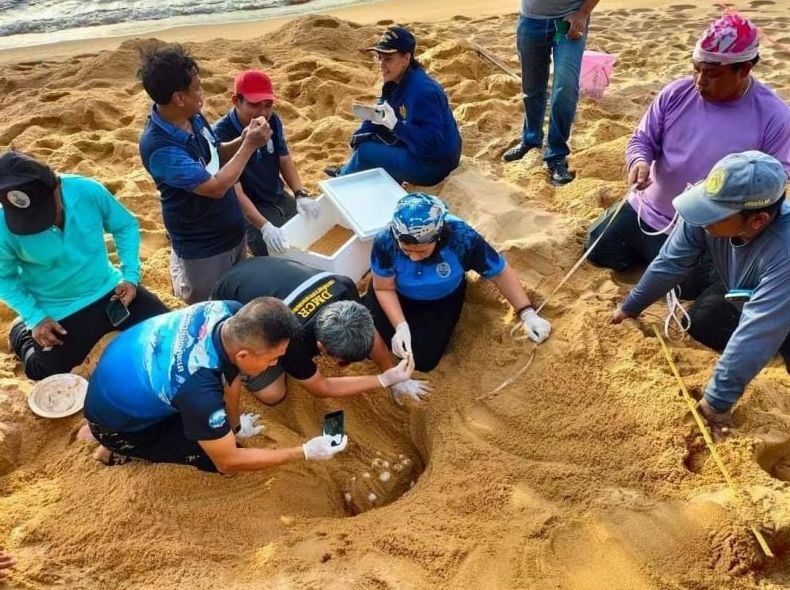Turtle lays over 100 eggs in Phang Nga, marking the start of nesting season

A sea turtle marked the start of nesting season by laying over 100 eggs in Phang Nga yesterday. Officials from the Khok Kloi area found the nest of 118 eggs, with track marks from the turtle, a Bang Khwan Beach.
The officials confirmed that a leatherback sea turtle had laid the eggs. Out of the 118 eggs, 106 were fertile and in good condition.
Officials moved the nest to a safer area so that it would not be damaged by the surf. The new nest has a fence to protect the eggs from animals and people. The high-tech nest even includes CCTV cameras, and thermometers to monitor the incubation process, The Phuket News reported. DMCR Director-General Atthaphol Charoenchansa confirmed it was the first time a turtle has laid her eggs on Phang Nga’s shores in this year’s season.
The DMCR chief said that specialists are seeing a return of sea turtles on Phuket and Phang Nga beaches. More turtles and nests are being spotted each season. From 2018 to 2019 only three nests were found, and in 2021 the total had already hit 18.
From 2012 to 2017, there were zero turtle nest findings. Atthapol said this was due to beachfront development in Phuket, as well as irresponsible fishing and marine pollution.
Atthapol said that the involvement of all sectors led to success in the conservation and rehabilitation of the leatherback turtle population in Thailand.
Leatherback sea turtles are the largest of all living turtles, and the fourth heaviest modern reptiles behind three crocodilians, according to Thai National Parks.
Leatherbacks aren’t the only sea turtles in trouble in Thailand. Green sea turtles are listed as an endangered species by the International Union for Conservation of Nature.
Only one in 1,000 sea turtle hatchlings is thought to make it to adulthood. Without guidance, many hatchlings die from dehydration because they don’t make it to the ocean fast enough.
But baby turtles’ tough journey doesn’t stop once they hatch. Artificial lights confuse turtle hatchlings and can cause them to waddle in the wrong direction away from the shore. Birds, crabs and other animals also prey on baby turtles.
In Thailand, park rangers play a crucial role in protecting sea turtle eggs and hatchlings. Rangers often move eggs they find to safer spots and help to safely guide hatchlings into the sea.
Latest Thailand News
Follow The Thaiger on Google News:


























